If you love bold, spicy flavors, then Mangalorean Chicken Ghee Roast is a must-try! This iconic dish from the coastal regions of Karnataka is a true testament to the rich culinary heritage of Tuluva-Mangalorean cuisine. Known for its fiery red color, rich aroma, and mouthwatering taste, Chicken Ghee Roast has captured the hearts and palates of food enthusiasts across India and beyond.
Made with juicy, marinated chicken slow-roasted in ghee with a special blend of aromatic spices, this dish represents the perfect marriage of heat, tang, and richness. The combination of Byadagi chilies, tamarind, and generous amounts of clarified butter gives it a unique depth of flavor that’s both comforting and indulgent. Whether you serve it with dosa, neer dosa, or plain rice, this dish is guaranteed to leave a lasting impression on anyone fortunate enough to taste it.
The Rich History Behind the Dish
Kundapur, a coastal town in Karnataka, India, is the birthplace of the popular dish chicken ghee roast. The dish is a signature of the Tuluva-Mangalorean cuisine, known for its fiery red color, tangy and spicy flavor, and rich aroma from being roasted in clarified butter (ghee).
The dish was created in 1957 by Tejappa Shetty and his wife, Prabhavathi, at their restaurant, Shetty Lunch Home, in Kundapur. The culinary innovation: Prabhavathi experimented with their existing chicken sukka recipe. She introduced a generous amount of ghee, added vibrant, mild Byadgi chilies, and enhanced the spice levels.
Rise to popularity: The dish’s unique taste quickly made Shetty Lunch Home a culinary landmark, drawing food enthusiasts from neighboring regions. The restaurant later opened more outlets in Mangalore.
Inspiration for variations: Today, chicken ghee roast is a staple in many Indian restaurants, and its flavor profile has inspired other ghee roast variations, including prawn and paneer versions.
The essence of this legendary dish lies in its perfect balance of ingredients – the same elements you’ll find in this authentic recipe that stays true to Prabhavathi’s original innovation. The generous use of ghee, the distinctive Byadgi chilies, and the careful balance of spices create that unmistakable flavor that has made this dish famous across India and beyond.
The Magic of Ingredients: Building Layers of Flavor and Texture
Understanding the role each ingredient plays in Chicken Ghee Roast helps appreciate why this dish has achieved such legendary status. Every component serves a specific purpose in creating the complex symphony of flavors that defines this coastal delicacy.
The Foundation: Chicken and Marinade
Chicken: Using bone-in chicken pieces is crucial for this recipe as the bones release gelatin during cooking, adding body and richness to the final dish. The bones also help the meat retain moisture during the high-heat roasting process.
Lemon Juice : Beyond tenderizing the meat, lemon juice provides the initial layer of tanginess that balances the rich ghee and intense spices. The acid helps break down tough protein fibers, ensuring tender, succulent chicken.
Curd: Acts as a natural tenderizer while adding a subtle sourness. The enzymes in yogurt further break down proteins, and its creamy texture helps other marinade ingredients adhere to the chicken.
Salt: Essential for drawing out moisture initially, then allowing the meat to reabsorb the flavored liquids, creating deeply seasoned chicken throughout.
Chili Powder, Turmeric, and Ginger-Garlic Paste: These form the aromatic base, with chili powder providing heat, turmeric adding earthiness and color, and ginger-garlic paste contributing pungency and depth.
The Soul: Masala Paste Components
Byadgi Chilies: The star ingredient that gives Chicken Ghee Roast its signature deep red color and mild heat. These chilies are prized for their vibrant color and fruity flavor without excessive spiciness, making them perfect for dishes where you want dramatic appearance without overwhelming heat.
Coriander Seeds: Provide a citrusy, slightly sweet flavor that balances the heat. When roasted, they develop a nutty aroma that adds complexity to the masala.
Cumin Seeds Contribute an earthy, warm flavor with slight bitterness that grounds the spice blend.
Fennel Seeds : Add a subtle licorice-like sweetness that complements the tanginess of tamarind.
Peppercorns : Provide sharp heat different from chili heat, adding another layer of spiciness and enhancing the overall flavor profile.
Fenugreek Seeds : Contribute a slightly bitter, maple-like flavor that adds depth and complexity.
Garlic Cloves : Beyond flavor, garlic helps bind the masala paste and adds pungency that mellows during cooking.
Tamarind Pulp: The key to the dish’s characteristic tangy flavor. Tamarind provides the sour note that balances the richness of ghee and intensity of spices.
The Enriching Elements
Ghee : The defining ingredient that gives the dish its name and character. Ghee not only provides richness but also has a higher smoke point than regular oil, allowing for the high-heat roasting that creates the dish’s signature texture and concentrated flavors.
Jaggery : Balances the heat and tanginess with subtle sweetness while adding depth to the flavor profile.
Curry Leaves: Provide a fresh, aromatic finish that brightens the rich, intense flavors.
How to Make It – The Step-by-Step Process
Let me walk you through making this incredible chicken ghee roast, just like I’d explain it if we were cooking together. The key to getting this right is in the preparation and taking your time with each step.
First, you’ll want to get your chicken ready. Take your bone-in chicken pieces and give them a good mix with lemon juice, a tablespoon of curd, salt, chili powder, turmeric, and ginger-garlic paste. Really work those flavors into the meat and then let it sit for at least an hour – this marination is crucial for building that deep flavor.
While the chicken is marinating, it’s time to work on what makes this dish truly special – the masala paste. Start by dry roasting your Byadagi chilies along with coriander seeds, cumin, fennel, peppercorns, and fenugreek seeds. You’ll know they’re ready when your kitchen fills with this amazing fragrant aroma. Let them cool completely before you try to grind them – this is important for getting a smooth paste.
Once they’re cool, blend these roasted spices with garlic cloves, tamarind pulp, and water until you get a silky smooth paste. This paste is really the soul of the dish, so take your time to get it right.
Now comes the cooking part. Heat up a generous amount of ghee in your pan and add that marinated chicken. Cook it on high heat for about 10 minutes – you want to get some nice color on the chicken. Once it’s nicely browned, remove the chicken pieces and set them aside, but don’t throw away those beautiful drippings in the pan.
Here’s a little trick – add your ground masala paste to the same pan, and then rinse your mixer jar with some water to get all that remaining masala goodness, and add that water too. Cook this masala for about 10 minutes, stirring frequently. Then add more ghee and continue cooking for another 5 minutes until you see the ghee starting to separate from the masala.
Now bring back your chicken pieces, add the jaggery and salt, and let everything cook together for about 15 minutes until the gravy becomes nice and thick. The chicken should be beautifully coated with that rich, red masala. Finally, throw in some fresh curry leaves and give it all a good mix.
This authentic recipe brings the legendary flavors of Shetty Lunch Home right to your kitchen, continuing a culinary tradition that has delighted food lovers for over six decades.
Preparing Chicken Ghee Roast for Parties
Chicken Ghee Roast is an excellent choice for entertaining, as its bold flavors and striking appearance never fail to impress guests. Here’s how to successfully prepare this dish for larger gatherings:
Scaling and Timing Strategy
Advance Preparation: The dish actually benefits from being made a day ahead, as the flavors continue to develop and meld overnight. This makes it perfect for party planning. Prepare the masala paste up to 3 days in advance and store it in the refrigerator.
Batch Cooking: For large parties, prepare the dish in multiple smaller batches rather than one enormous batch. This ensures even cooking and better control over the final texture. Each 1kg batch serves approximately 5-6 people as a main course or 8-10 as an appetizer.
Make-Ahead Timeline:
- 2 days before: Prepare and freeze masala paste
- 1 days before: Marinate chicken
- 6-8 hours before the party: Complete cooking, store refrigerated
- Just before the party: Gently reheat and garnish with fresh curry leaves
Presentation Tips for Parties
Serving Style: Present in traditional brass or copper serving bowls to enhance the authentic experience. The contrast between the dark metal and vibrant red dish creates a stunning visual appeal.
Garnishing: Fresh curry leaves, thin onion rings, and lemon wedges make excellent garnishes. Consider serving with traditional accompaniments like neer dosa or steamed rice arranged attractively around the main dish.
Temperature Management: Use chafing dishes or slow cookers on a warm setting to maintain ideal serving temperature throughout the party without overcooking.
Perfect Lunch Box Packing
Chicken Ghee Roast travels exceptionally well, making it ideal for packed lunches, picnics, or meal prep. The rich ghee content helps preserve the dish and actually enhances flavors during storage.
Packing Techniques
Container Selection: Use leak-proof containers with secure lids. Glass containers are ideal as they don’t absorb flavors or colors and can be safely reheated.
Portion Control: Pack individual portions to maintain freshness and prevent repeated opening of containers, which can lead to faster spoilage.
Layering Strategy: If packing with rice or bread, keep them in separate compartments to prevent soginess. The natural oils in the dish can make bread soggy if stored together for extended periods.
Storage Guidelines
Refrigeration: Properly stored, Chicken Ghee Roast maintains quality for up to 4 days refrigerated. The high ghee content acts as a natural preservative.
Freezing: Can be frozen for up to 3 months. Freeze in portion-sized containers for easy thawing and reheating.
Reheating: Reheat gently, adding a splash of water if needed to restore consistency. Microwave on medium power to prevent the ghee from separating.
Always ensure the dish is completely cooled before packing, and maintain cold chain during transport. Include ice packs for longer journeys, especially in warm weather.
Perfect Pairing: Dishes That Complement Chicken Ghee Roast
The intense, rich flavors of Chicken Ghee Roast pair beautifully with various accompaniments that either complement its boldness or provide cooling contrast.
Traditional Accompaniments
Neer Dosa: These paper-thin, delicate rice crepes are the classic pairing. Their mild flavor and soft texture provide the perfect canvas for the bold ghee roast flavors.
Plain Steamed Rice: Simple basmati or jasmine rice allows the complex flavors of the dish to shine while providing a neutral base that absorbs the delicious gravy.
Ghee Rice: For a more indulgent meal, ghee rice with whole spices complements the rich flavors while maintaining the coastal Indian theme.
Modern Pairings
Butter Naan or Kulcha: These rich breads can stand up to the intense flavors while their soft texture provides pleasant contrast.
Coconut Rice: The subtle sweetness of coconut pairs wonderfully with the tangy, spicy flavors of the ghee roast.
Appam: These fermented rice pancakes, especially with their soft centers, create an excellent base for the flavorful chicken.
Cooling Accompaniments
Raita: Cucumber or onion raita provides cooling relief from the heat while adding freshness to the meal.
Pickled Onions: Thinly sliced onions dressed with lemon juice and salt cut through the richness beautifully.
Fresh Coconut Chutney: A traditional coastal accompaniment that adds coolness and complements the regional flavors.
Complete Meal Suggestions
Traditional Coastal Meal: Serve with neer dosa, coconut chutney, and solkadhi (kokum drink) for an authentic Mangalorean experience.
Contemporary Indian Dinner: Pair with garlic naan, jeera rice, cucumber raita, and a light dal for a well-rounded meal.
Party Menu: Combine with other coastal specialties like koliwada prawns, fish curry, and coconut-based vegetables for a themed feast.
Prefer something creamy instead of fiery? Try this Butter Chicken curry for a rich, restaurant-style North Indian alternative.
Other Related Recipes You Might Like:-
- Guntur Chicken Masala – spicy chicken in a Guntur-style gravy.
- Chicken Keema Paratha – minced chicken stuffed paratha with aromatic spices.
- Butter Chicken – chicken cooked in a rich, buttery tomato gravy.
- Red Chilli Sauce Chicken Sandwich – fiery red chili chicken in a sandwich style.
- Russian Chicken Cutlets – lightly spiced chicken cutlets with a Russian twist.
- Afghani Chicken Curry – creamy, mildly spiced Afghani-style chicken curry.
- Andhra Green Chilli Chicken – spicy Andhra-style chicken with green chilies.
Chicken Ghee Roast
Description
Chicken Ghee Roast is a classic dish from Mangalore that’s known for its bold, fiery flavors and rich aroma. Juicy chicken is first marinated, then slow-cooked in ghee with a fragrant blend of roasted spices, tamarind, and Byadagi chilies. The result is a deep red, spicy, and slightly tangy curry that’s both comforting and indulgent. Perfect with neer dosa, steamed rice, or chapati, this recipe brings the authentic taste of coastal Karnataka right to your kitchen.
Ingredients
To marinate the chicken
To make masala paste
To make chicken ghee roast
Instructions
Prep Work
-
Marinate the chicken
Mix chicken(with bone), lemon juice, curd, salt, chilli powder, turmeric powder, and ginger garlic paste mix it. Let it rest for an hour.
-
Dry roast spices
Roast Byadagi chillies, coriander, cumin, fennel, peppercorns, and fenugreek until fragrant. Cool before grinding. -
Grind masala paste
Blend roasted spices with garlic, tamarind pulp and water to make a smooth paste.
Method
-
Cook marinated chicken
Heat ghee in a pan and cook marinated chicken on high flame for 10 minutes.
-
Set chicken aside
Remove chicken pieces from the pan and keep aside.cook the stock for a minute or so. -
Cook masala paste
Add ground masala paste and water to the mixer jar to get the remaining masala sticking in the jar and transfer the water to the pan. Cook for 10 minutes. -
Add ghee and cook
Stir in more ghee and cook for 5 minutes until ghee separates. -
Combine chicken and masala
Add jaggery, cooked chicken, and salt. Cook for 15 minutes until thick. -
Finish with curry leaves
Add fresh curry leaves and mix well.
Nutrition Facts
Servings 5
- Amount Per Serving
- Calories 320kcal
- % Daily Value *
- Total Fat 18g28%
- Saturated Fat 9g45%
- Cholesterol 85mg29%
- Sodium 720mg30%
- Potassium 380mg11%
- Total Carbohydrate 6g2%
- Dietary Fiber 2g8%
- Sugars 2g
- Protein 28g57%
- Vitamin A 1200 IU
- Vitamin C 8 mg
- Calcium 60 mg
- Iron 3 mg
* Percent Daily Values are based on a 2,000 calorie diet. Your daily value may be higher or lower depending on your calorie needs.

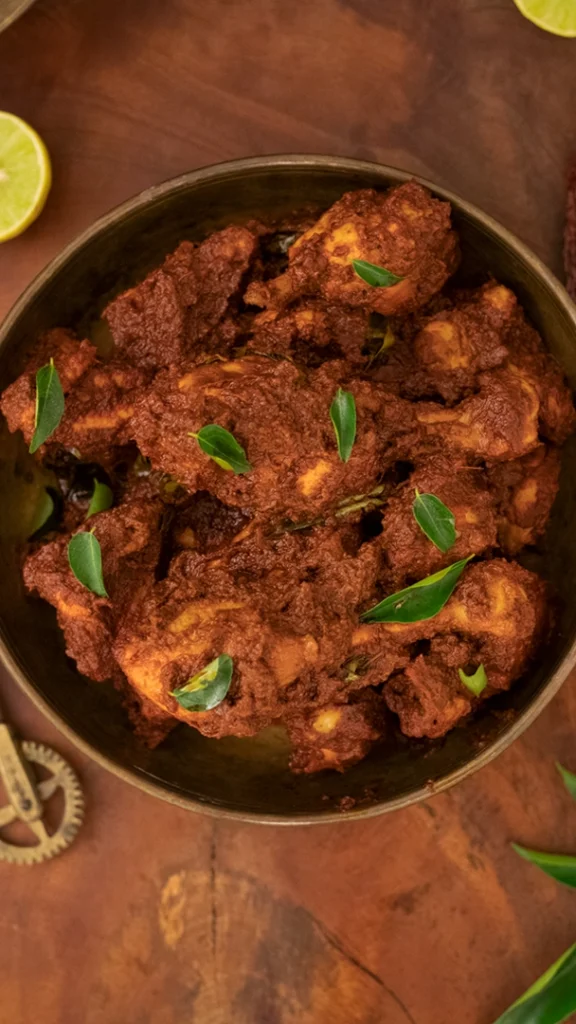

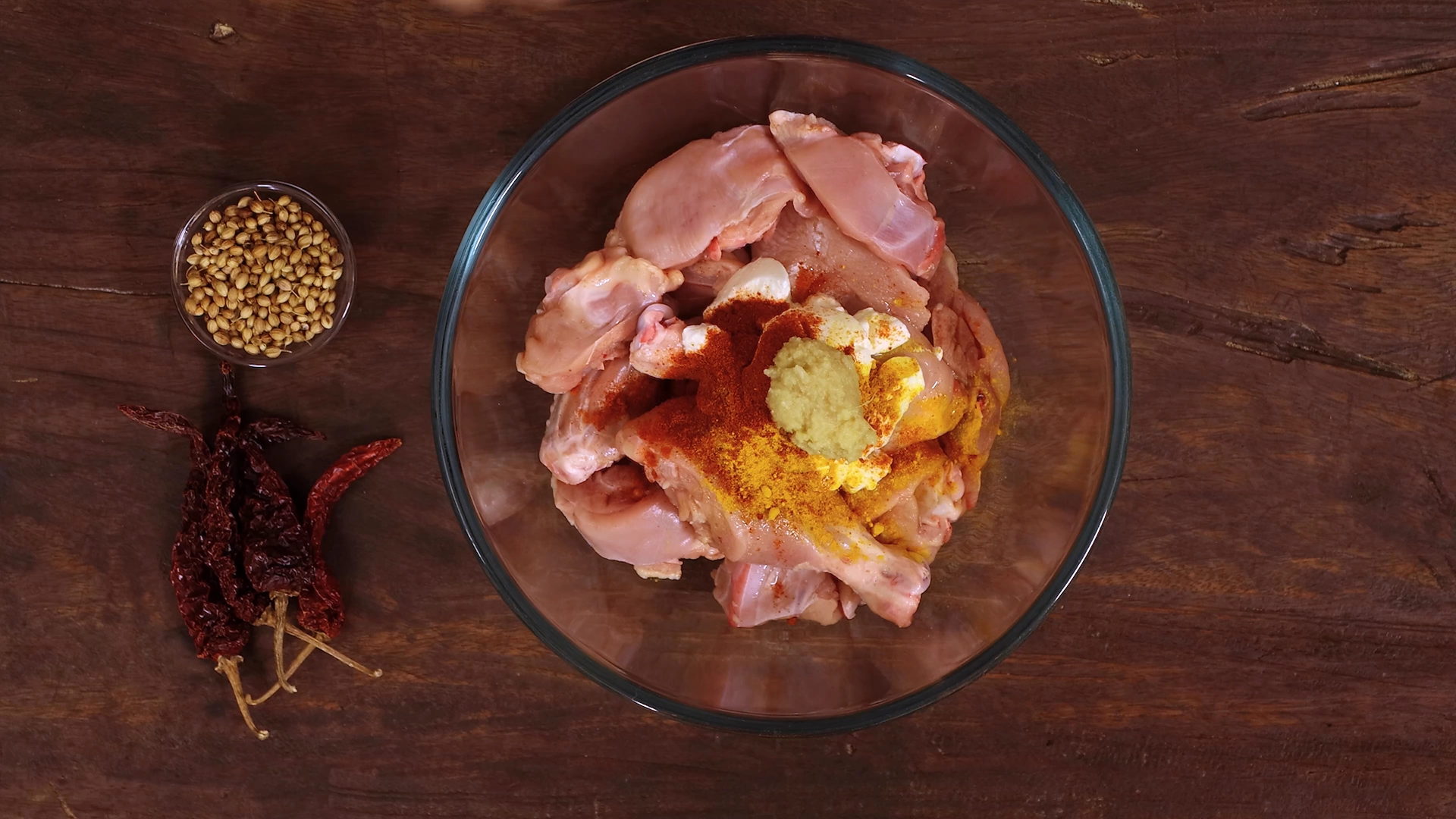
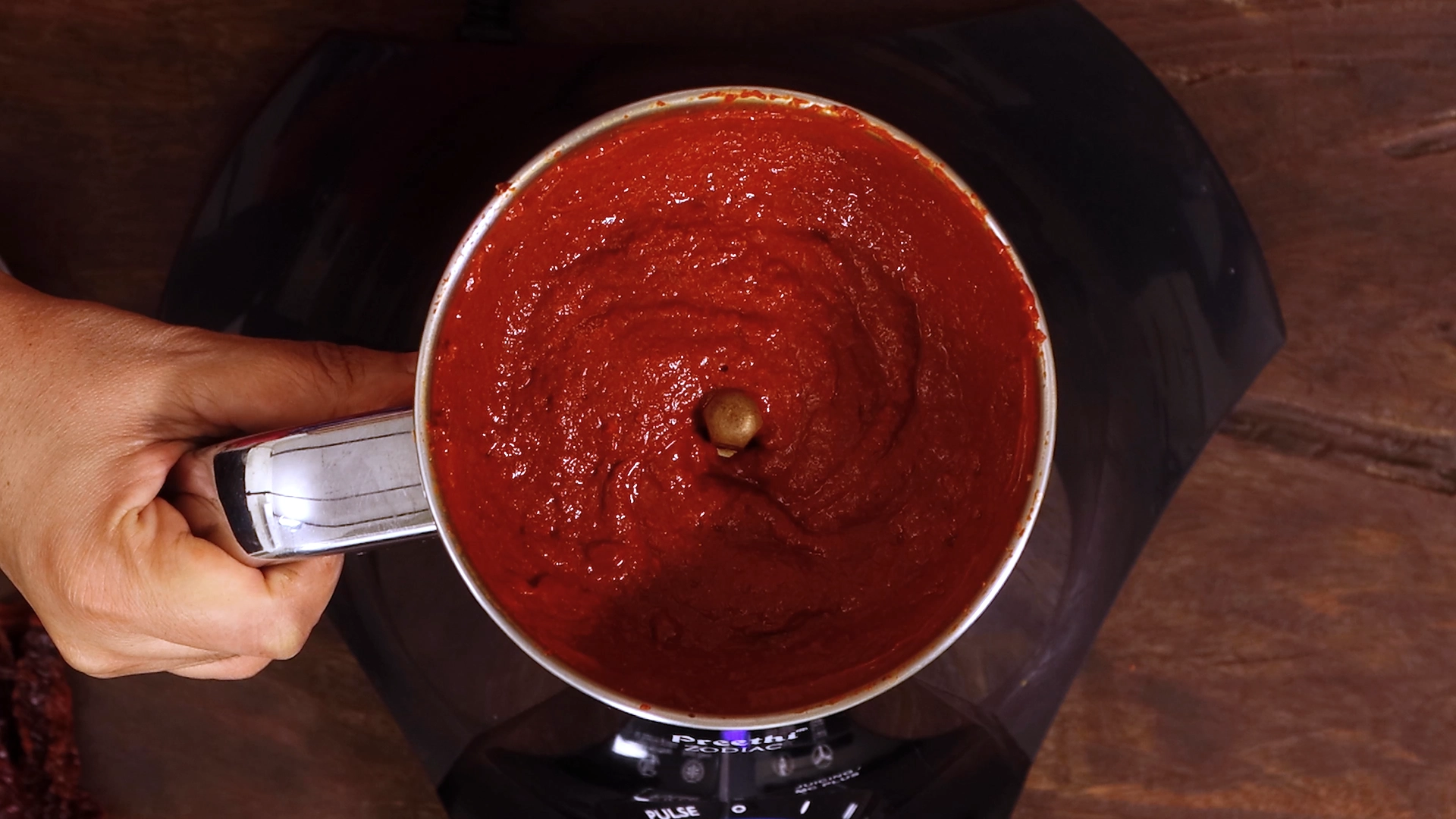
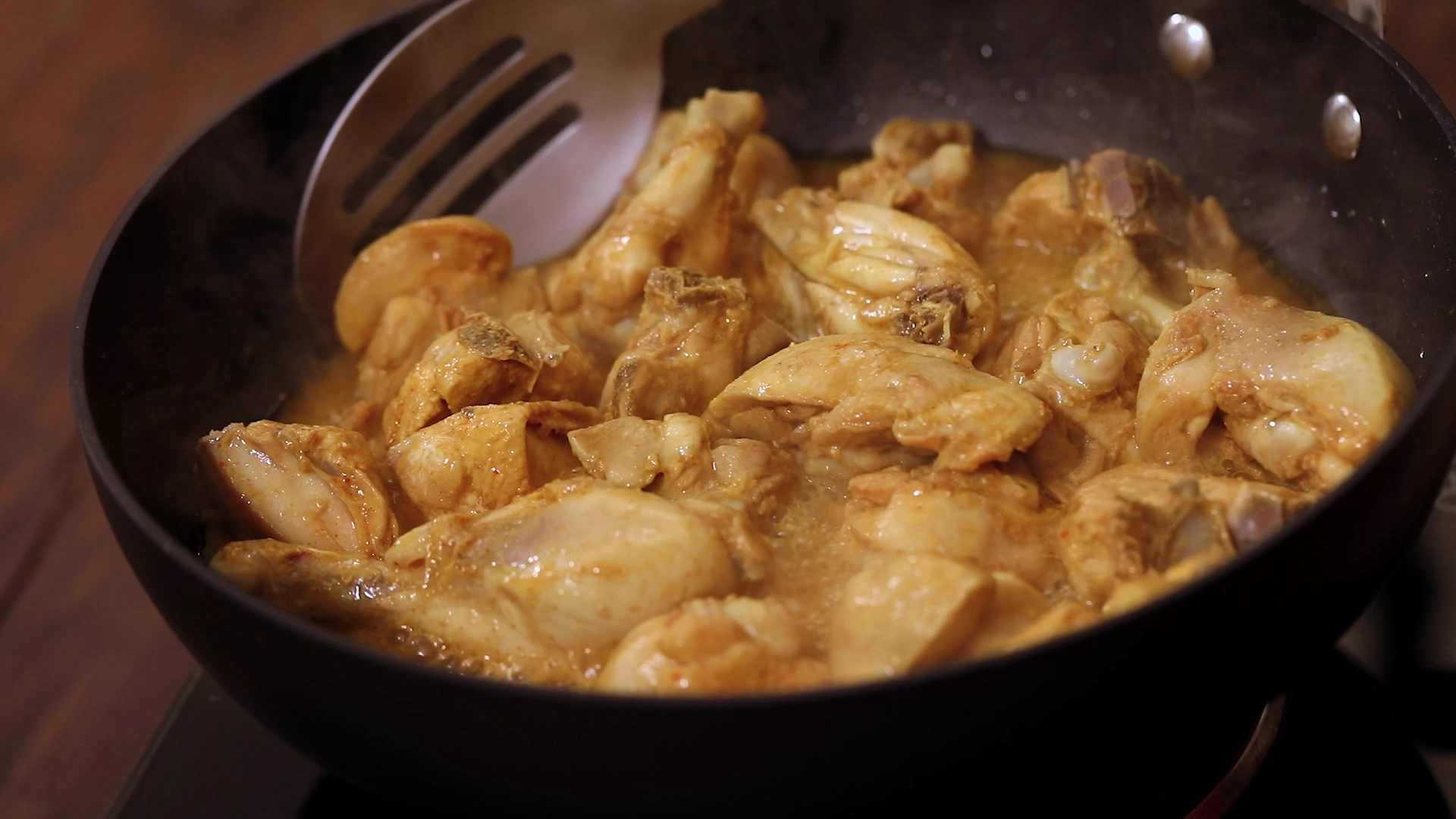

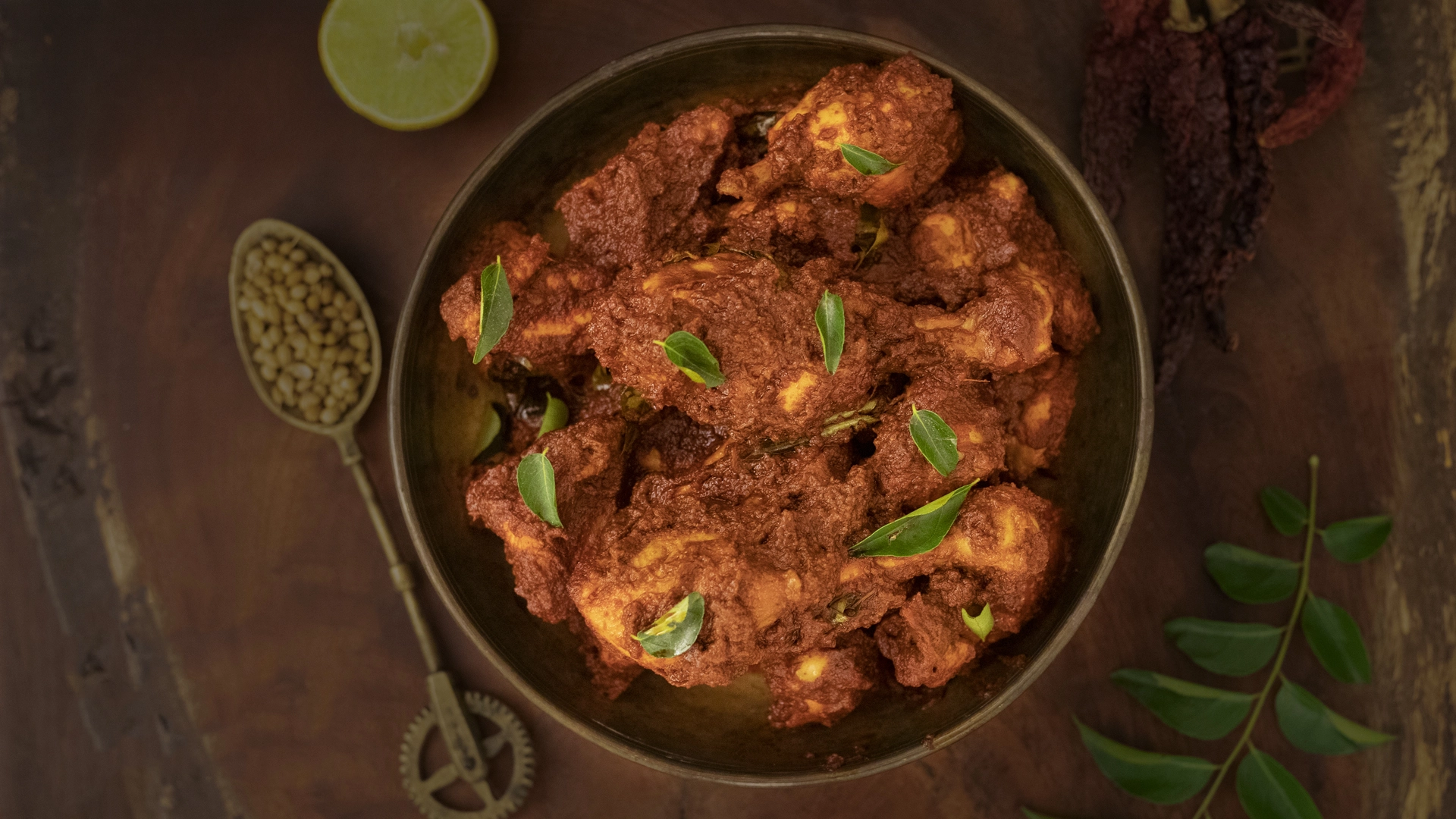
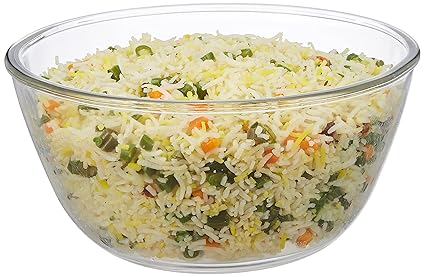

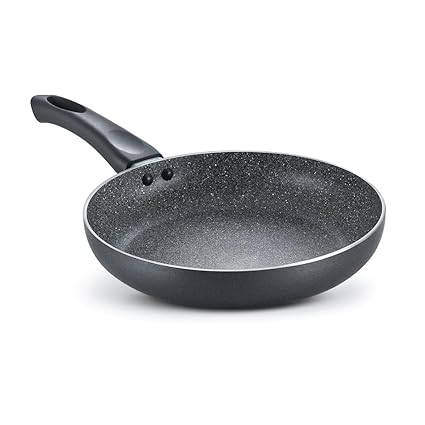


User Reviews
I am a beginner cook and I tried this recipe. It’s foolproof and finger licking.
Thank you,Glad you liked it 😊